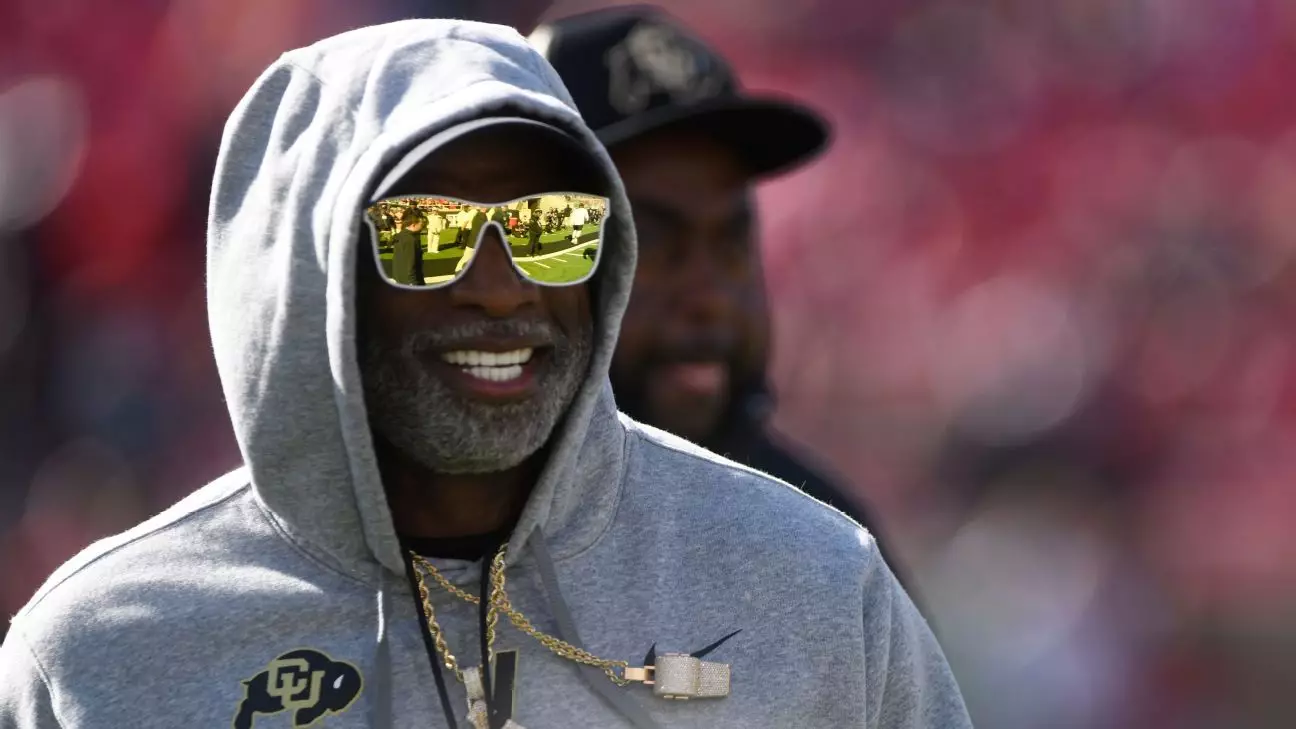In a move that reflects both ambition and a deep-seated shift in college athletics, Colorado coach Deion Sanders has secured a staggering five-year contract extension totaling $54 million. This monumental agreement not only solidifies Sanders’ position as a top-tier coach but marks him as a pioneer within a system that often prioritizes short-term gains over long-term character development. Casual observers might view this as mere numbers, yet the implications of this contract ripple far beyond the football field, challenging the very essence of collegiate sports today.
College football has often walked a tightrope, balancing the demands of winning with the ethical responsibility of nurturing young athletes. Sanders, commonly known as “Coach Prime,” has inherited a program that just a year prior saw dismal results, concluding the 2022 season with a woeful 1-11 record. His revolutionary tactics and charisma have drawn significant attention, resulting in an impressive turnaround that has captured both the hearts of fans and the interest of prospective students. This presents an urgent question: Are we witnessing the crafting of a new standard in college athletics, one that comes with unyielding expectations and colossal financial commitments?
Childhood Dreams to Professional Realities
Gone are the days when coaching was more about educational mentorship and less about financial gain. Sanders’ ascent reflects the disturbing trend of treating student-athletes as mere assets in a corporate world, transforming dreams of education into commercial ventures. When Deion expresses his intention to develop young men off the field, it’s important to wonder whether the backdrop of shiny contracts and expansive salaries allows for genuine mentorship. While aspiring coaches celebrate his achievements, one must critically assess if this new era has taken a toll on the foundational ideals of college performance.
Statistics tell half the story, and Sanders’ contract is impressive indeed, but it comes paired with a stark reality: the trajectory of student-athlete development is deeply intertwined with monetary success. The recent surge in applications—including a striking increase from communities of color—hints at a positive transformation. However, one must ask: does this rising interest stem solely from Sanders’ magnetic persona, or do these numbers also reflect students envisioning football as a ticket to financial security rather than an educational experience? This asks for a profound reflection on the real motives behind student applications and school choices.
The Illusion of Impact
While the Colorado football team is basking in newfound glory, evidenced by their high viewer counts and sold-out games, the narrative can quickly obscure the underlying issues. The reported economic impact of home games tallies up to a staggering $146.5 million regionally. However, this brings forth ethical discussions regarding whether the economic boon outweighs the pressures put onto young athletes, whose futures hang precariously in the balance of tickets sold and commercial partnerships. Are we willing to prioritize pocketbooks over promising futures?
The university’s narrative also posits Sanders as a transformative figure, with athletic director Rick George proclaiming that he has “revolutionized college football.” Yet, has he merely shifted the paradigm toward a flashy and lucrative brand of football that prioritizes recruitment prowess over holistic development? It is certainly convincing that Sanders has elevated Colorado’s national relevance, but one must consider at what cost this success comes and whether it serves the long-term goals of the student-athletes involved.
Rethinking Success in a Changing Landscape
As college football stands on the precipice of a new era, with mega-deals and soaring expectations becoming the norm, it’s essential to reflect on broader implications. Sanders is more than just a coach; he is a cultural phenomenon embodying the contradictions of modern college athletics. With more eyes on college football than ever, Sanders unapologetically embraces the spotlight, asking for a five-bedroom home with acreage—an embodiment, perhaps, of the lifestyle that comes with this heady success.
Through Sanders, we confront a unique intersection of opportunity and obligation. Are we nurturing future leaders, or are we entrenching them in a cycle of hyper-competition and financial gain? As the applause echoes from sold-out stadiums, the narrative must expand beyond wins and losses to include the fundamental purpose of college sport: to educate and empower young individuals. Perhaps it’s time we ask ourselves not just who wins, but who truly benefits from these seismic shifts in college athletics.



Leave a Reply